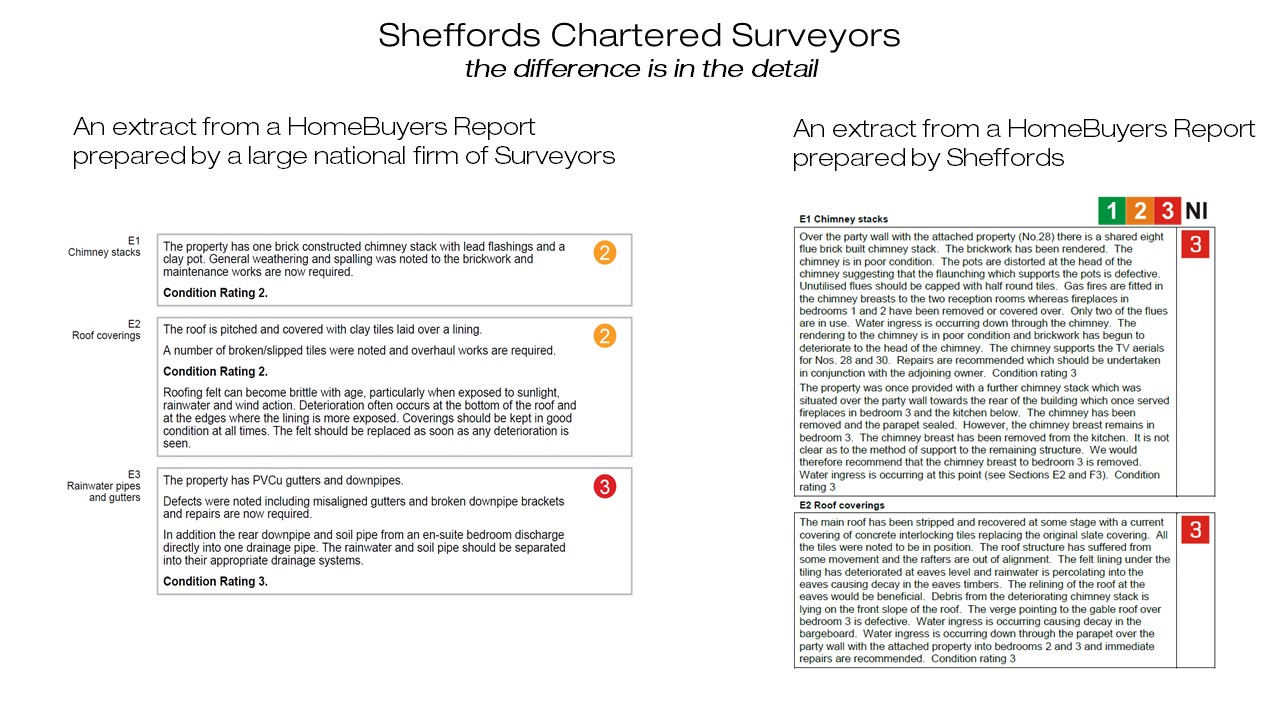Frequently Asked Questions

FAQs
Why is it important to choose a RICS regulated firm?
The Royal Institution of Chartered Surveyors, or RICS, is the world's leading professional body dedicated to the economics and management of land, property, construction and related environmental issues. This means any advice given by their members will be of the highest professional standard. Members are bound by a strict code of conduct that regulates how they deal with you. All surveyors must hold a current professional indemnity insurance policy to reflect the work undertaken.
What can Sheffords provide that larger corporate surveyors do not?
We pride ourselves on local knowledge and individual attention to our clients' requirements. The most important aspect is that you know what you are committing yourself to in purchasing a property. It is important that the client understands the service that the surveyor will provide in this respect.

If you would like the surveyor to talk through the findings with you, he/she will. If you don't understand anything within the report , he/she will, where possible, explain in layman's terms. If you proceed with the purchase and undertake the work recommended in the survey and find that you don't actually understand what you need to do, phone us.
Are you insured to carry out your work? Do you operate a complaints procedure?
Yes. We are required to maintain Professional Indemnity Insurance for all our work as a condition of being a member of the RICS. This is controlled and monitored by the Institution. Having a formal complaints procedure is also a requirement of the RICS. A copy of this can be supplied on request.
Do I need a Level 2 or a Level 3 survey?
The best way to make sure that you invest your money in a safe, structurally sound home is to commission a home survey. A Level 2 should usually be adequate for properties built in the last 100 years, in reasonable condition and of traditional construction. If you have reason to be particularly worried about the structure of the building or are buying a period property or you intend to significantly alter the property, however, then it is probably best to instruct a Level 3 survey is undertaken.
Do you inspect and test the services?
Both Level 2 and Level 3 surveys include a visual inspection only to confirm the presence or absence of the services and their operation by normal use - drainage, hot and cold water, central heating, electricity, gas. We will provide you with guidance on having tests undertaken. The technology involved in central heating systems and the electrical installation is such that these should only be checked by qualified specialist technicians - typically Gas Safe and NIC EIC registered firms. Where there are large or complex systems we would discuss with you the specialist testing of those services, especially central heating and hot water systems, air conditioning, lifts or electrical installations.
I am about to get quotes for some building work, what should I look out for?
When going out to tender for a building, development or renovation project or even a small extension, it is important that you are able to compare the quotations from the contractors on a "like for like" basis. Merely providing them with a set of plans will not suffice as the plans could be interpreted in different ways.
I have an issue with a party wall, can you help?
We accept appointments from building owners proposing to undertake construction work coming under the Party Wall etc Act 1996 and/or on behalf of adjoining owners to safeguard their interests when such work is being carried out that could affect their property (please see Party Wall Matters).
What is a Schedule of Condition and why is it recommended to be included within a Party Wall Award or attached to a Lease?
A Schedule of Condition is a report recording the current condition of a property. The Schedule of Condition will often include a photographic record. We will encourage the building owners to have a Schedule of Condition of the adjoining owners' property undertaken prior to the commencement of works in order to ensure that the condition of the property is agreed. This will thereby safeguard the interests of both parties. A Schedule of Condition can be referred to should damage occur as a direct result of the works. The Schedule of Condition, if undertaken, will become a part of the Award and therefore a legal record of the condition for later referral and can aid both parties in resolving any dispute.
A Schedule of Condition may also help alleviate any potential difficulties between the landlord and a tenant if attached to a lease of commercial premises.
